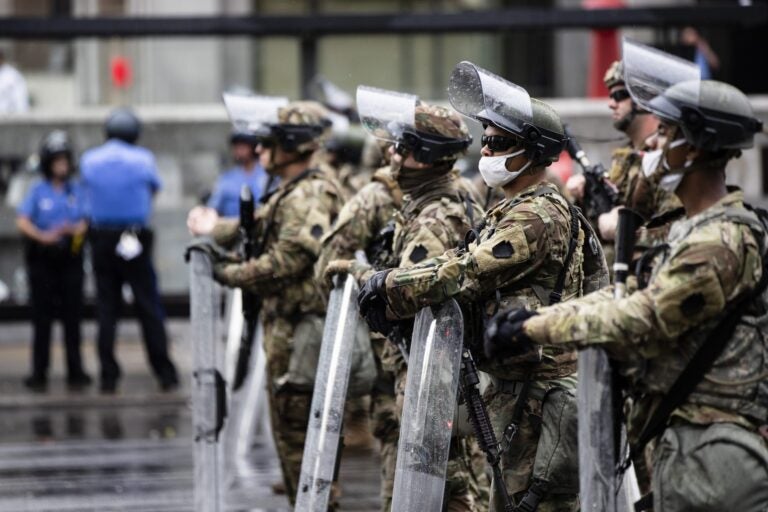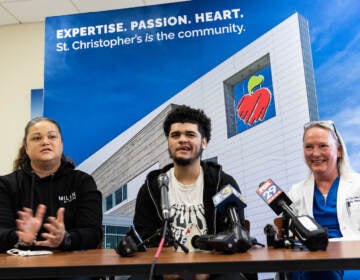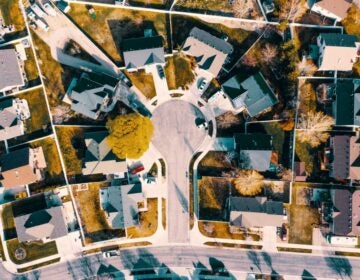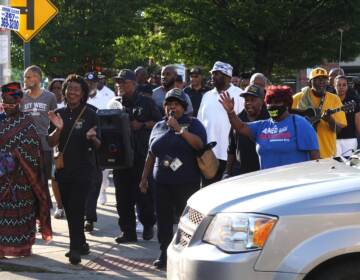Why Rep. Amen Brown is wrong about the National Guard
Calling in the national guard is taking the lazy way out, writes Pastor Carl Day, a prominent public safety advocate.

Pennsylvania National Guard and police stand guard in Philadelphia, Wednesday, June 3, 2020. (Matt Rourke/AP Photo)
This article appears ahead of ‘Brokering Peace: The House of Umoja & a Safer Philadelphia,” a WHYY Community Conversation on Nov. 30 focused on improving public safety by revisiting lessons learned from the past. Register here.
State Rep. Amen Brown has called on the outgoing governor, Tom Wolf, to deploy the Pennsylvania National Guard to “provide much needed support in Philadelphia in addressing this gun violence crisis.”
The representative’s plea followed the first weekend of November, where 39 people were shot, including nine individuals shot outside a bar in Kensington. To date, over 450 people have been killed in Philadelphia.
While I understand the frustration with the violence taking place, deploying the National Guard to the city would be a disaster.
For starters, the National Guard would be nothing more than glorified babysitters.
They can’t enforce laws, and their priority would be to protect property, not people. The National Guard can’t restore hope, they can’t improve the conditions of our schools and curriculum, they can’t heal the fractured relationship between police and communities, and most importantly, the national guard isn’t capable of squashing beefs.
Secondly, what are we, as a city, going to do that’s innovative and urgent while the soldiers are allegedly slowing the violence down? Lastly, the National Guard can’t stay forever; so when they leave, what happens next? What’s the plan?
I regularly walk the streets of Philadelphia, particularly those considered “high crime areas.”
The majority of the people I’ve talked with don’t want to adhere to strict curfews or witness the military on every corner of their neighborhood. I’ve even been asked: “Will the soldiers even care about us, or will they be even colder towards us than the police?”
Calling in the National Guard is taking the lazy way out. What Philadelphia needs is more innovative intervention efforts.
The city has done a good job with some of the prevention programs that currently exist.
These programs are much needed, as today’s joyful child can easily turn into tomorrow’s traumatized shooter. But most people who criticize prevention programs think they should completely solve the problem.
Yes, homicides are rising, but it could be even worse without programs and people, such as Ryan Harris with As I Plant This Seed; Anton Moore, founder of Unity in The Community; Ricky Duncan at NOMO; James Aye and Kendra Vandewater at YEAH Philly, and John Solomon, who started Endangered Kind.
It’s also worth noting my program, Beat the Block, a transformative healing program that retains cohorts of young men at four month intervals, and pays them $500 a week if they meet their personal and professional goals.
But what the city must do better at is funding and scaling innovative intervention programs.
Advance Peace in Stockton, California, is an example of how investing directly into the lives of at-risk men can reduce violence. My program is similar, but with a curriculum more culturally relevant to Philadelphia.
Over the last 10 months, Beat the Block has recruited 50 men — all of whom were either directly impacted by violence or involved in the streets — and helped them find employment, establish businesses, build their credit or obtain their commercial driver’s license. We’ve started a referral pipeline for these men, who are the most credible messengers, to pull their peers off the streets. If innovative models like this are able to scale, I believe it could truly make a difference.
We are in unprecedented times. We need to be willing to break free from the political norms that have guided our public safety investments and experiment with new bold ideas, while scaling the programs that have proven to work.
And we have to play the long game. For programs and people to really make a difference, the city and foundations should consider offering enough funding for three to five years. Why? Because you can’t change hearts and minds, or eliminate all street beef and retaliatory violence in 365 days.
Our leaders must commit to taking innovative action and making bold investments before waving the white flag and calling in the troops.
I would caution Rep. Brown — and anyone else who holds this type of law and order mentality — to consider the rebellion and long-term community damage deploying the National Guard can do. I understand the desperation, and the perception that we’ve run out of ideas, but let’s be sensible, reasonable, and prayerful.
It’s time for politicians and the People to DO MORE. We have to discard the outdated political playbook and really engage communities to both understand and solve this problem.
Carl Day is the Pastor and Founder of Culture Changing Christians Worship Center and a public safety advocate. Follow him on Twitter @PastorCarlDay

Saturdays just got more interesting.
WHYY is your source for fact-based, in-depth journalism and information. As a nonprofit organization, we rely on financial support from readers like you. Please give today.






